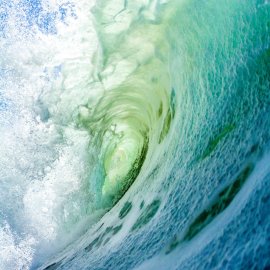New Systems Thinking
-
English
-
ListenPause
[intro music]
Welcome to World Ocean Radio…
I’m Peter Neill, Director of the World Ocean Observatory.
There is much talk these days of “new systems thinking,” as a reaction to the failure of old systems that have been revealed as failures or as isolated parts of an ever more complicated world of technology, economics, politics, and social crises. As society has grown in population and need, as knowledge has grown through research, computation, and invention, the world seems almost overwhelmed by the consequence of failure, the complexity of alternatives, and myriad options that face us in search of a way forward.
An informative new book, edited by James Gus Speck and Kathleen Courrier, The New Systems Reader, published this year by Routledge, surveys the “alternatives of a failed economy;” the table of contents includes sections and articles that address new principles for governance, new values, a new planetary economy, new ownership concepts, new forms of economic democracy, new community-based pluralistic systems, commonality, collaboration and planning, and evidence of an emerging new economy. It is heady, provocative stuff.
Trying to understand these things, and to visualize their inter-relationship, requires grids and diagrams that represent new projections of how we see the world. I call them McKinsey Projections, after the high-powered global consulting group, comprehensive representations of very complex ideas and their dynamic interactions assembled by very smart people attempting to include and map every aspect, every bit of data, every possibility of attraction and reaction inside and out to be known and considered, a responsible, albeit obsessive, all-inclusive chart to portray and enable change.
When I think about the ocean, I realize that as natural system thinking, it is as wide, deep, and inter-active as these intellectual system representations. And when I think of the actuality of the ocean as key to our response to the multiple exigencies of the 21st century, I try not just to identify the options, but simplify the correlations as a means to organize and present ways that, through integrated systems, the ocean is the place and paradigm for future success.
What does all that mean? As an example, let’s list a few of the most pressing needs we face in today’s world: energy, water, and food being the three areas most relevant to future survival. And let’s then examine technological ocean-dependent innovations that pertain to each: for energy, geothermal, salinity gradient power, wind, wave, tidal, and solar generation; for fresh water, desalination; and for food, aquaculture. Each of these is a novel system in itself, already proven beyond concept to practical application, and each, if understood not as independent potential, but as integrated, self-supporting and affirming enterprise, can be understood and implemented as a “new system” with necessary economy and efficiency at scale. To envision, put a geothermal plant beside a desalination beside an aquaculture plant; tie them together to mutually reinforce the needs of them individually and together, one output, for example, becoming the available input for the next, and you have a new model for solution and practical response. As of now, we are developing each of these as a project apart, with separate demands for capital, land acquisition, construction, operation, and connection to existing networks for distribution, finance and accounting, taxes, and labor. But what previously was seen as efficiency is now transformed and maximized exponentially by new systems thinking into new hyper-efficient value that is ocean-dependent, non-polluting, sustainable, and productive beyond the prior limits of any single one. Multiple causes channeled into singular effect: an inventive, elegant, and transformational outcome.
What the ocean demonstrates is the power of interconnection. That is how it works. Society is no different – except when it is disrupted by multiple disconnections as we know today. It is ironic that “globalization,” a fundamental integration of the world economy through ocean transport and trade, has failed, not because of its operational inefficiency, but rather because of its underlying premise to enable unrestricted growth and consumption of goods and services less advantageous than we thought, more disadvantageous, even destructive, than foreseen. If a natural resource as universal as the ocean is understood only as part of a system, then we have failed to see it as a system itself. If we accept the ocean as the one system that truly connects us all, then we might also accept its essential contribution to a new worldview and design by which we innovate, plan, own, manage, govern, and share what Nature provides through its oceanic bounty.
We will discuss these issues, and more, in future editions of World Ocean Radio.
[outro music]
This week on World Ocean Radio: new systems thinking offers alternatives to failing structures and behaviors. As food, energy and water are the three aspects most relevant to future survival, we argue that we must examine the innovations that pertain to each: aquaculture, renewable energy and desalination--to create an integrated, self-supporting new system that is key to a sustainable future.
About World Ocean Radio
Peter Neill, Director of the World Ocean Observatory and host of World Ocean Radio, provides coverage of a broad spectrum of ocean issues from science and education to advocacy and exemplary projects. World Ocean Radio, a project of the World Ocean Observatory, is a weekly series of five-minute audio essays available for syndicated use at no cost by college and community radio stations worldwide.
World Ocean Radio is produced in association with WERU-FM in Blue Hill, Maine and is distributed by the Public Radio Exchange and the Pacifica Network.
Available for podcast download wherever you listen to your favorites.
Image
Photo by Mark Harpur on Unsplash @luckybeanz
- Login to post comments



